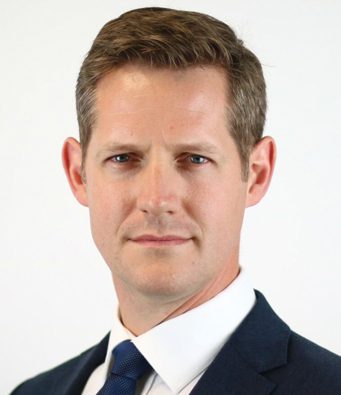Finding 62,000 new security personnel is unrealistic and unnecessary when technology can provide a solution, writes Chris Sisson, pictured, Business Development Director (Security), at the contractor Wilson James.
According to the British Security Industry Association, the UK’s private security sector needs to increase the number of licensed security officers by 62,000 to more than 450,000 over the next 12 months if it is to meet growing demand and mitigate the effects of those who are leaving the sector. Securing this huge number of workers is so ambitious as to be unrealistic. I will also argue that this need not cause concern, however, for the simple reason that finding and hiring this number of people is almost certainly unnecessary – because the security industry isn’t currently doing enough to find the right balance between technology and personnel.
Although its work is crucial in keeping UK plc up and running, the security industry isn’t unique in having challenges recruiting enough people; sectors as diverse as IT, agriculture, construction, healthcare and education are all experiencing difficulties attracting enough workers to fill empty positions. According to the ONS [Office for National Statistics], there were 1.225m job vacancies in August to October 2022, a slight decrease of 46,000 from May to July, but still indicative of a tight labour market where organisations are struggling to find enough workers to fill jobs.
That situation is compounded by the fact that, alone among developed countries, the number of working age Britons who not employed or seeking work has risen since the end of 2019 and remains higher than at any time since the Covid pandemic. This again must be seen in a wider context where UK productivity is some 15pc below the United States, Germany and France, and has barely grown since the financial crisis of 2008. Clearly, the solution to the problem faced both by the security industry and UK industry at large demands a new approach.
The security industry is under pressure as never before to provide an effective and efficient service, with ever-increasing demands being placed on its resources. But when it comes to threat treatment planning and the security posture of our customers, we would do well to look to the role that technology can play in security delivery, instead of heaping more recruitment challenges on ourselves.
Technology can play a vital role in security, allowing organisations to do more with less. By deploying appropriate security technologies, security personnel can be freed up to focus on other tasks, such as risk identification, incident response and providing concierge, first aid and other valuable services. This not only helps to improve the overall security posture of an organisation, but reduces costs and provides customers with added value. Indeed, used correctly, technology can actually provide organisations with a more accurate picture of their risk profile. Leveraging data analytics and artificial intelligence (AI), security technologies can automatically identify patterns in threat data such as feeds from video cameras, for example, that would be difficult or impossible for humans to detect. Alerted to these incidents in real time, organisations are able to make better decisions about how to protect themselves from attack. They can also be more responsive in the case of an incident, and they can reduce future budget challenges in the process.
Ultimately, technology invites organisations to deploy their security people more effectively. That’s because deploying technologies shouldn’t primarily be seen as a method of replacing personnel, although that may be both possible and appropriate in some instances. Instead, smart organisations are working with their security providers to use technology to augment security personnel and help them to do the best job they can.
This is best observed when considering the ‘Detect, Deter, Delay, Respond and Recover’ methodology. This, as many will know, is a comprehensive approach to security that relies on a layered approach to protection. Technology can play a critical role in supporting this strategy by providing organisations with a more accurate delivery in the ‘Detect’, ‘Deter’ and ‘Delay’ phases, for example helping to automate the detection of suspicious activity. The vital human factor then comes into play at the ‘Respond’ and ‘Recover’ phases, albeit also with a focus on ‘Delay.’
I am certainly not suggesting that people are replaced wholesale with technology; as I hope I have made clear, the ability to deliver greater productivity, often at lower cost, is based on technology and people working in concert. I also agree with the BSIA’s aims to make the security industry more attractive to those who are looking for a career that combines enormous opportunity, professional satisfaction, and real purpose. Deploying technology alongside security personnel only enhances that ambition, as it frees workers to undertake more valuable services to their clients and provide more business value.
Let’s be clear: recruitment challenges for the security industry and many other sectors will remain for a time, and while we need to recruit people to come into our industry, we must ensure they are skilled in ways that meet the needs of the future, where technology and its ability to deliver insight drives better behaviour.
Indeed, the industry’s focus should be on improving the skills of these individuals, preparing them for a fulfilling career in the industry and paying them accordingly, a sentiment matched with the recent SIA sector profile released on November 23. That strikes me as a more meaningful and sustainable way for the industry to meet the ends of its clients than hoping to find 62,000 new workers over the next 12 months.









